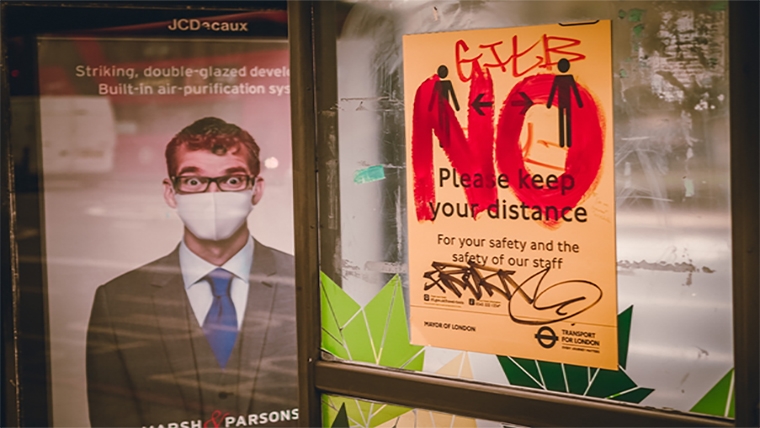
By Alison Brook*
First, the pandemic, then widespread protests and now the war in Ukraine. But are these things all linked? It turns out that history is full of examples of epidemics leading to a prolonged period of social unrest and even war.
Roberto Censolo and Massimo Morelli writing in the journal Peace Economics, Peace Science and Public Policy point to numerous plagues in history when social tensions built up over the course of the epidemic and acted as incubators for social uprisings in the years following.
Analysing 57 epidemic episodes between the Black Death of the 1300s and the 1918 Spanish Flu, they found that protest movements that predated the epidemic were initially dampened, or “crowded out” during the epidemic displays of national unity. However, in the aftermath of the epidemic social unrest increased sharply.
According to the study, this happens for three reasons. First, the policy measures deployed to limit the spread of the disease, like lockdowns and compulsory mask-wearing, increase the tension between society and institutions. Second, pandemics tend to have unequal economic and health impacts on different groups in society, exacerbating inequality. Third, “the psychological shock” caused by the pandemic can lead people to believe irrational narratives about the disease's causes and spread.
A symbiotic relationship between pandemics and conflict?
According to scholars Alexi Gugushvilil and Martin McKee, wars and epidemics have a long and close history: “on the one hand, circumstances associated with wars may facilitate pandemic spread; on the other hand, COVID-19 has already heightened xenophobia and nationalism, which in turn can encourage armed confrontations.”
They also point out that public discord is often exploited by powerful forces during these times for their own objectives: “Those German municipalities that suffered most in the 1918 influenza outbreak were the ones that saw the greatest electoral gains for the Nazi Party a decade later”.
Has the pandemic caused inequality to worsen?
Analysis from the IMF suggests countries with higher income inequality when a pandemic strikes are more vulnerable to social unrest and polarisation.
Inequality has risen sharply in many advanced countries since the 1980s, often blamed for rising social tensions. This is seen starkly in countries like the USA which shows a clear trend of rising incomes for the top 10% and falling incomes for the bottom half of the population. By contrast, New Zealand and Australia remain “significantly more equal than North America” according to a 2020 report from The World Inequality Database. However, another measure that is linked to social inequity and unrest – labour share of income – has fallen dramatically across the board since the 1980s.
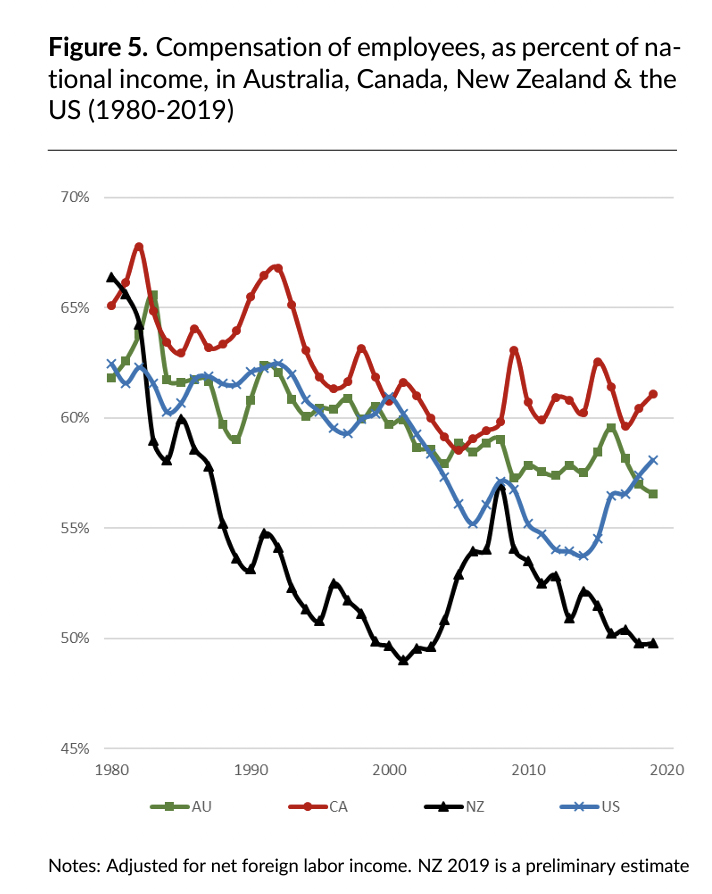
Source: World Inequality Lab, Issue Brief 2020, 07 November 2020
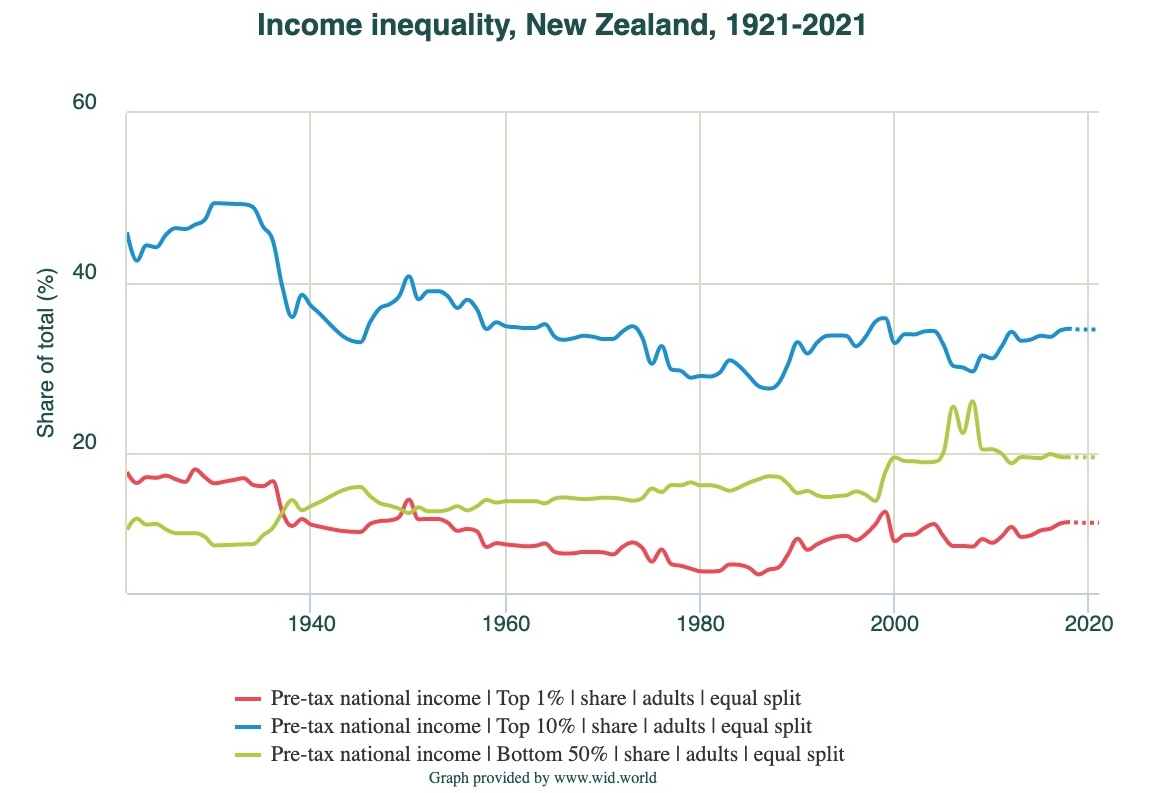
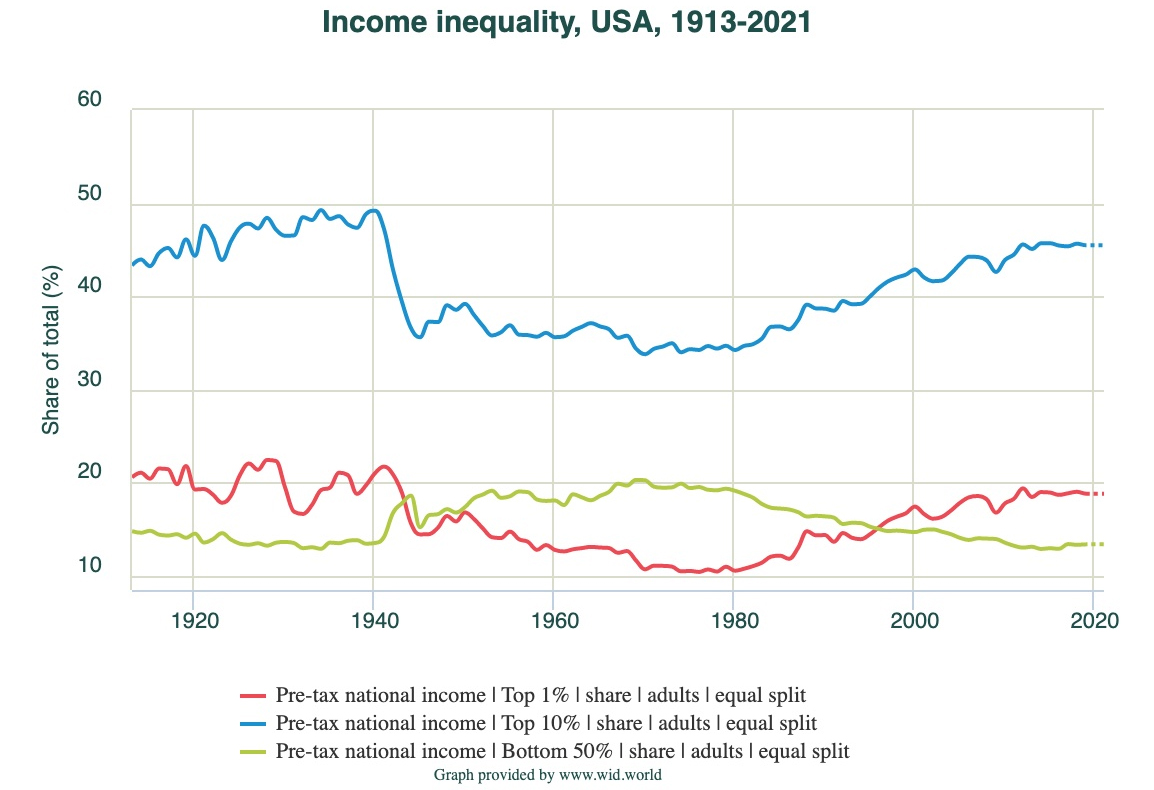
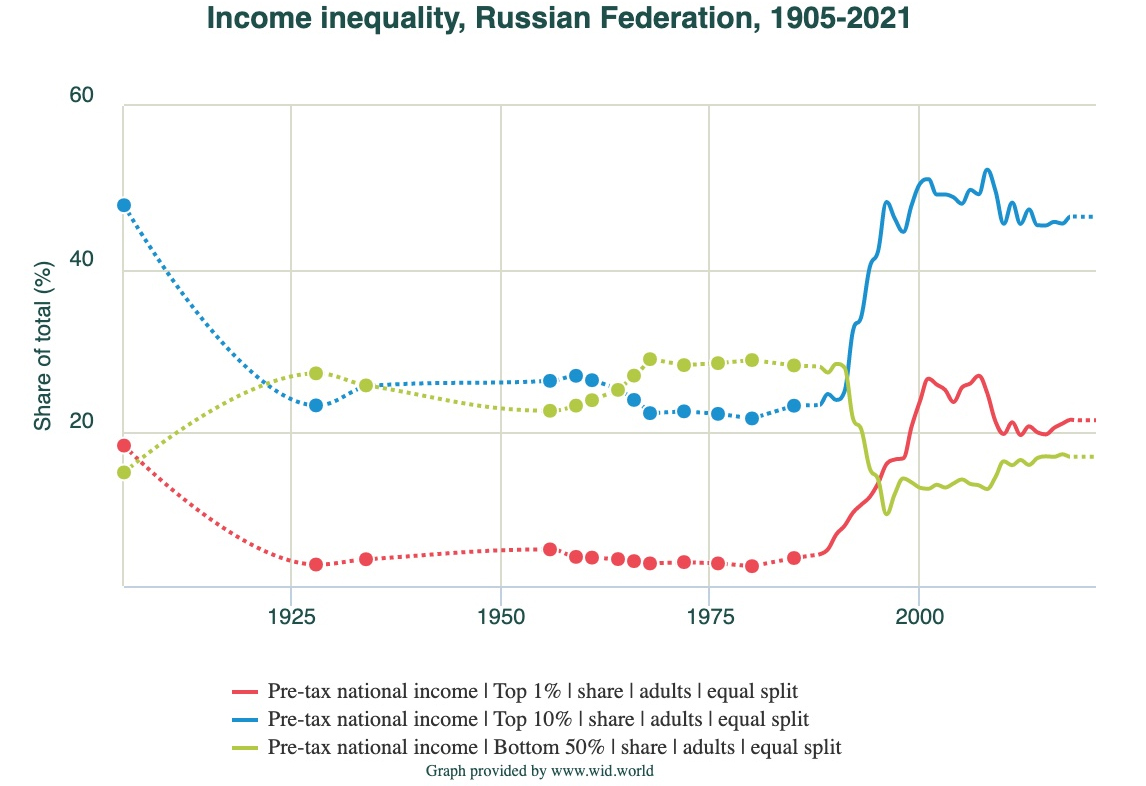
Recent studies suggest that income inequality may have actually improved during the pandemic in many developed countries due to generous government spending programmes. However, wealth is likely to have become more concentrated due to asset price inflation caused by extremely loose monetary policy.
As Michael Dauderstädt writes in Intereconomics, while the pandemic may not have increased income inequality, it has undoubtedly affected people differently. The poor tend to have a higher incidence of pre-existing health conditions and less access to healthcare. They are also more likely to live in overcrowded houses and are less able to work from home. Over time, these differences reinforce income and wealth inequalities, providing a breeding ground for social unrest.
Fear of being left behind
While rising economic inequality may be only part of the recent protests, the discontent that predates the pandemic stems from a perception by parts of society that they are being ignored or left behind.
A recent IPSOS study found that the increasing pace of digitisation and climate change tended to be interpreted as a threat, particularly by people with less access to education and income. The increasing pace of these transformations raised the danger of further polarisation of society and an increase in anti-democratic attitudes which disrupts social order.
Despite the historical precedents, the future is not set in stone. It depends on policy settings and measures adopted at this pivotal point in history. What’s clear is that unless the underlying causes of inequality and polarisation are addressed the social upheaval will only compound over time. As author James Clear writes in Atomic Habits: “Riots, protests, and mass movements are rarely the result of a single event. Instead, a long series of microaggressions and daily aggravations slowly multiply until one event tips the scale and outrage spreads like wildfire”.
*Alison Brook is from the Knowledge Exchange Hub at the Massey University campus at Albany, Auckland. She is on the GDPLive team. This article is a post from the GDPLive blog, and is here with permission. The New Zealand GDPLive resource can also be accessed here.
28 Comments
The inequality and lack of intelligence in leadership of countries leads do wars.
The people in the world lately have been electing preety dumb leaders.
The inequality causes people not to get involved in the democratic process and this results in dumb leaders being chosen and end result are for everyone to see.
Like the government brushing off the protest as just being representative of a fringe element of people who have been feeding on misinformation? They do themselves a disservice if they just park it as no more than that.
... as I see it , the government promised transparency & kindness ... yet appears to have delivered the opposite ... opaqueness , divisiveness , and a cruel MIQ system ...
100's of people do not travel long distances to set up camp in Wellington for no good reason ... most were really hacked off with the mandates ... and I dont blame them ...
... a minority used the occasion to push their weird paranoid agendas , or just to enjoy a fight ... anarchy ... Ardern is sinking low , playing a cheap trick to besmesrch everyone there as being these reprobates ...
Anyone else noticed how closely Gummy Bear's anti-Arden rhetoric mirrors the US political right's misogynist attacks on Hillary Clinton and Nancy Pelosi? The language is virtually interchangeable.
Actually the government has delivered a low covid casualty rate and a relatively healthy economy, but heaven forbid the right should acknowledge that.
"Most were hacked off with mandates" is a nonsense that's been well and truly debunked. I live in Wellington and have witnessed most of the protests. From the first, they have all had a strong (ugly) American political influence. Good luck with trying to legitimise the violence we saw last week.
Now the Politicians have had a taste of what JOE PUBLIC has to put up with on a daily basis, Guess what, they don'. t like it. This is not the way New Zealanders should behave
Have been saying this for a while now. The vaccine mandate was just the match that lite the fuse. The explosive is actually the increasing impoverishment of the population through a deliberate government policy of increasingly un-affordable homes and relentless lowering of real wages by pursuing an immigration driven low wage low productivity economy.
Which ever party the democratic process delivers does nothing to change these factors and relentlessly goes on to make matters worse. What choice are people left with other than to turn to violence. I strongly believe that what we are seeing now is just the beginning of what will be a very violent period.
I will again repeat J F Kennedy's quote because it is so true.
“Those who make peaceful revolution impossible will make violent revolution inevitable."
Hold on to your seats .
Have you read The 4th Turning Chris-M?
Can definitely recommend if you are (like I was) trying to make sense of this madness. Its more or less playing out exactly how the Strauss-Howe theory suggests.
We will likely require a global conflict and a reset of the global financial system in order to restore social and financial stability. It may see the demise of the USD as the world reserve currency and the opposite of the last 40years. The theory suggests the period of chaos will end around 2028...so another 6 years of chaos (after starting around 2008 - it usually plays out over a 20 year period...similar to the 1929 stock market crash through to the end of WW2 and the Bretton Woods conference)
No, I have not. It looks interesting and I may get it. What is going on is obvious and right in front of us. In some ways we should not need a book to tell us something that is so obvious. The other thing is that while history can tell us a lot and it often repeats, It never plays out the same way each time.
Hopefully we can avoid further upheaval but the Labour Party tour of those damaged grounds was unnecessary. Disturbingly, they seem detached from any awareness they might be contributing to the social unrest developing around them. The whole misinformation play is a red herring when their neo-liberal policy is the obvious culprit.
Anyone who has read The 4th Turning....I can see the pattern in those income/inequality charts with present day (boomers) leading the world back to chaos and likely to use millennials to sort the mess out. Who if the theory is correct, will reduce inequality like was present in the 50's-80's before the boomers took over society, before their children do the same as the boomers...
As someone who lived in the period from the 1950s to the 1980s, I remember it as a repressed and suppressed period socially, even if was more financially 'equal'. Everyone was equal at a lowish level. It was only after the shackles were released did we realise what we were denied, or denying ourselves. Of course, not everyone shifted up at the same rate, or took advantage of the new opportunities and freedoms at the same rate. Clearly those that didn't felt aggrieved.
It is unrealistic to think we can go back 'there'. It's unrealistic not only in NZ, but in places like China where the gains have been much more recent. Being forced back there by some sort of autocratic leadership, or economic circumstance, will just lead to sharply higher resentment levels because you know what you are losing.
The better approach is to try and 'raise up' folks who feel they missed out. But that too will be tough as 'events' (many of which we don't know are coming) unstitch good intensions. We should keep trying however. We should also be realistic that we are kind of wasting time, wasting limited resources, and spinning our wheels if we try to address the concerns of the last tin-foil hat wearers. They have always been there, and they have always been blind. Best to move on without them, but with the willing.
The interesting thing about NZ data is that income inequality is not worsening, despite the barbeque 'analysis'. Wealth inequality might be though, and there are ways to address that because it is mostly to do with house prices, even if they are divisive in their own way (but probably less divisive than not dealing with them).
Have you read the book David?
Whether you realise it or not, the view you provide above more or less exactly fits the generational archetype they describe in the Strass-Howe theory. It’s what you don’t see that will surprise you and it’s that the millennial generation below will attempt to reverse what you see as prosperity. Most boomers see today as good while young people see it as hell and are going to do everything in their power to change it. In attempting to undo the repression you describe in your young adult years, the boomers with support from the generations around them having created a different kind of hell for those the generations below them.
The free love, peace, drugs, rock and roll and protests of the 1960’s and 1970’s to undo the shackles of repression you felt will be replaced by millennials attempting to rebuild social and financial stability in a world that has become selfish and dog eat dog - one type of unhappiness replaced by another, just in a different form.
The parents of boomers (the greatest generation) would be horrified to see what has happened to society the last 20 years and the millennials are of the same archetype as them. Hence the hostility that we see at present between boomers and millennials. Millennials remind boomers of their parents, hence why they appear to dislike and are somewhat threatened by them as a generation (and vice versa).
Why did house prices rise so dramatically? Massive population growth in an attempt to keep consumption up, in an era of potential stagnation? Or is that to be ignored and just say it's because we couldn't generate urban sprawl fast enough? Someone somewhere decided all this growth was a good thing. The experiment has been run and it wasn't a good thing. That hasn't stopped the growth cheerleaders from crowing again though?
Bollocks, David Chaston. You have had enough put under your nose, to rebut what you are inferring.
Is it your opinion (it sure ain't a fact) that wealth can be had ex resource draw-down?
Sorry, but this is a finite planet - nothing to do with tinfoil hats.
Time you did some research.
... David did overlook the finitenessity of the planet's tin resources ... and since Covid vaccinations have become widely available the need for tin foil hats has risen exponentially beyond just the usual failed Malthusians , and out into the newly sprouted paranoic anti-vaxxers ...
Nevertheless , the majority who enjoy life and human progress , will continue to prosper ... as it should be , on a world where although the planet's natural resources are in finite supply , the most abundant resource is the human mind , who's ideas & abilities are unlimited ...
Wouldn't be so quick to bag the anti-vaxxers Gummy, that Pfizer information that was going to be suppressed for 75 years has been released just days ago. Doesn't look to good to me.
I read it and I also read that their recommendation is for the booster at 5 months, but if I showed this information (from US Disease Control site), I would be called a tinfoil-hatter. The media has a part to play as they are simply stating the Government's position.
. .. would happily bag the idiotic anti-vaxxers in a heart beat , my man : OMG ... they are so deluded ... so " played " by the deliberate purveyors of misinformation....
We are poorly led & have been for decades. Democracy as we (I) knew it has gone. The social democrats are now running the cutter & you can see for yourself how many good ideas they have. The post-WWII reset is coming to its natural end. It's lasted about 80 years or a lifetime if you will. Historically, this is not unusual. And with the boomers a post war thing, starting to show their age & as some would say (rather badly in places) things are fraying around the edges. Even worse in some places.
The millennials are trying hard, just as we boomers were doing in the 70's, 80's & 90's, and as they're finding out, things don't always go to plan, just like we did with carless days, petrol rationing, the sharemarket crash (87-91) & even the Asian Crisis/Y2K debacle at the millennium. As most of you know, I'm a boomer, a mid-boomer as it happens (as it covers the 1946-64 period of almost 2 decades) so are just about to retire to the library, whilst letting the younger generations to get on with things.
We were a very lucky generation in the sense that we were the first of 3 generations that wasn't shipped off to a war as my grandfathers were in 1914-18 & my father's generation were in 1939-45. Vietnam doesn't count. It didn't take that long for me to figure that out (in 1981) but many of my age still haven't, or didn't for one reason or another, so ended up in situations mostly of their own making, that wasn't what they were hoping for, or what they thought would happen. Remember, not every boomer is wealthy.
However, many took their opportunities either through education or once again, through bloody hard work, & have a bit saved up (or did until covid came along) for their latter years, hopefully (he says at 67). Our parent's generation lived through a severe economic depression & WWII & were quite happy to retire when they did & have lived when they did (according to my mother). She had no desire to live my generations life, just as I have no desire to live my children's or my grand-children's life today. What's the point? We can't do even if we could. So where does that leave us? Still in a pretty good place all said & done.
I didn't do university, I wasn't smart enough, but I did spend 5 years outside NZ in my early 20's & that was my tertiary education. What did it teach me? That NZ is a pretty good place & it still is today, even though a lot of people that live here don't understand that. Why don't they understand that? Because they never got off their arses, or worked their buts off, probably, so ended up bitching & snitching about ... well, pretty much everything sadly.
Looking at tomorrow, what's in store? For me & my wife of 40 years, old age, if we're lucky. We are a close knit family & that's exactly what we worked hard at creating, so if we end up in hospital we hopefully we'll have one or two visitors, just as I/we did for both our parents over the past 20 years.
So here's a tip, ddon't watch the news at 6.00 o'clock tonight, go & visit someone (even if they have covid) & tell them how lucky they are. They're either New Zealanders or living in New Zealand & that's a good thing.
Snap,
I am the same age, went to uni got 2 soft degrees. I bought my house for 24 000 in 1977 raised 4 children comfortably on a school teachers income. Yes family is everything. How hard we tried to espouse good values viz, caring for others and working hard.
Nice post John 👍
I think a lot of younger people want to get off their butts and work but have completely lost faith in the poor leadership in politics and workplaces, as well as the daunting task of taking on massive amounts of debt to buy a home and start a family. For many there appears to be no good path ahead and are crying out for leadership, but instead get silenced or told to go to therapy for the anxiety and depression (likely caused by the bad environment they now find themselves in which they aren’t responsible for/didn’t create)
I’m not convinced that hard working nurses, policemen…the list goes on are thriving in NZ at present. Stressful, underpaid employment and a government hell bent on propping up private assets. That’s when they’re not busy turning sprinklers on those peasants beneath them
It is a decent analysis, but the big thing missing, which is acknowledged as not being included is wealth inequality. And that's all that really matters at the moment as it is huge. And with more and more becoming financialised, ergo those with the greatest existing wealth can have the greatest potential to earn more from it, so again, wealth inequality is probably the only thing that matters. Pity the wealthy have so much influence that they have made it near impossible to measure, hence no analysis.
Some years ago the monetary assets of parliamentarians were published as they must be every so often. It was interesting to note that Nathan Guy, the then minister of agriculture for the National Party, owned 23 properties. Shortly after that revelation I wrote a letter to the Herald saying that the stars were in alignment for New Zealand to become a Monarchy based on a landed gentry with Nathan Guy as its first king from the newly established Royal House of Guy. Aunty Herald actually published the letter and the idea was taken up and further discussed by the National Radio afternoon panel discussion.
Those decrying the Labour Government (i.e. capitalism with a safety net) so vehemently should take the time to look at which side their bread is buttered on.
Incidentally, both Communism and Capitalism may have different trajectories but their end result is always the same: the inequitable accumulation of wealth and power (usually authoritarian) by the very few.
In fairness to Nathan Guy there are a small number of Corporates that may own well over a thousand houses....I think Sanson Corp (Friedlander) may be one and also one owned by Masfen; someone might be able to supply more accurate up-to-date info on this as I'm relying on memory here.
Figure 5 reveals how neoliberal economics has resulted in a transfer of national wealth from wage and salary earners to the already wealthy or comfortably placed business owners/shareholders/senior executives. In particular the graph show how ordinary New Zealanders have sustained the biggest hit on their incomes relative to other nations. This precipitous drop in real income coincides with the introduction of the Employment Contracts Act, which was a deliberately inspired and successful political attack on unions. The greatest drop occurred in periods of National governments, which should be no surprise to anyone. They represent the winners in the readjustment of wealth distribution in New Zealand and occasional Labour governments have made little impression on the overall pattern of elite enrichment. Any attempts at redistribution will be stoutly resisted by greedy winners in this Darwinian economic model.
Yes, but put that in context; this is atop the drawing-down of finite stocks and capacities. So at some obvious point, equality became impossible (real time) and even less possible as time goes on.
Shoot-the-messenger and straw-man comments - like David Chaston's 'tinfoil hats' and your 'relative to other nations' - need to be bypassed. Try Wright's 'Short History of Progress' as a primer. All politics is subservient to energy/resources/physics/ecology.
You’re arguing an historical inevitability about what happened from the 1980s onwards. I challenge that analysis, as few things in history are inevitable at the time events are occurring. It only looks inevitable in retrospect. Decisions made by politicians, egged on my their supporters and financial backers, helps to explain the pattern of income mal-distribution better than “it’s all down to resources”. Naked self-interest by the affluent also helps to explain the decisions made.
Theres no garantee that life was meant to be easy. Theres those that put in the effort and those that spend their entire lives whining about the government and blaming them for all their ills while sitting on the couch eating potatoe chips and watching re runs of the Kardashians.
The N Z govt did a great job of protecting our sorry arses from covid deaths while you had a minority of whiney anti-everythings. Those people are pathetic and always will be.
Grow a set.

We welcome your comments below. If you are not already registered, please register to comment
Remember we welcome robust, respectful and insightful debate. We don't welcome abusive or defamatory comments and will de-register those repeatedly making such comments. Our current comment policy is here.